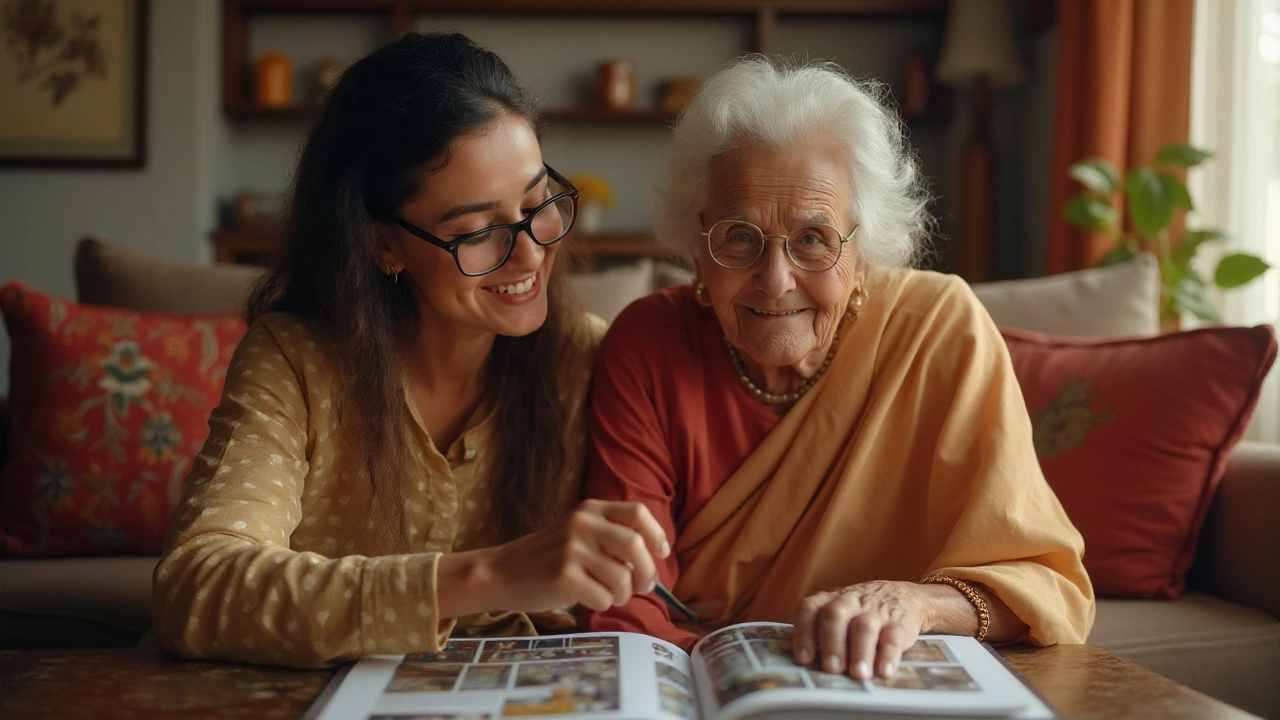Essential Steps for When Seniors Can No Longer Live Independently
 Jan, 26 2025
Jan, 26 2025
As our loved ones age, there comes a time when living independently may no longer be a viable option. This transition can be filled with emotions but also presents an opportunity to enrich their golden years with support and care. Recognizing the right time to step in and offer help is crucial for their safety and happiness.
Identifying appropriate care solutions and finding the perfect balance between independence and assistance can be daunting. However, with the right knowledge and guidance, it is possible to make these decisions with confidence and compassion. Explore the available resources and options to ensure your elderly loved ones receive the care they need.
- Recognizing When Help is Needed
- Types of Elderly Care Services
- Evaluating Living Arrangements
- Balancing Emotional Well-being
- Finding the Right Support
Recognizing When Help is Needed
Aging is a natural process that comes with its own set of challenges and milestones. One of the most notable is discerning when a loved one might need extra help to maintain their quality of life. This decision is rarely black and white, requiring a keen observational eye and a tender heart. The key is to identify subtle changes in behavior, health, and overall demeanor. It's not merely about the physical ailments they might experience but also about their emotional and mental well-being. Delays in responding to vital signals can lead to more severe risks, so vigilance becomes increasingly paramount.
One primary indicator that elderly care might be essential is changes in their daily routines. For instance, you might notice unopened mail piling up. Bills go unpaid, and important documents are misplaced more frequently. These seemingly small oversights can snowball into significant problems if neglected. You may also see changes in their hygiene habits. An unusual body odor or visible lack of grooming may indicate they're struggling to maintain personal care without assistance. Furthermore, unattended homes with spills, disorganization, or broken fixtures can signify that household maintenance is too daunting.
Adapting to physical limitations is another aspect to monitor closely. Older adults often hesitate to admit they need help due to pride or fear of losing independence. You may observe increased fatigue, unsteady gait, or bruising from minor falls, which are often dismissed as isolated incidents but are clear red flags. Regularly assess their ability to move around safely and manage tasks like cooking, which may present hazards in the absence of adequate senior living arrangements. A decline in cognitive function can also manifest as forgetfulness or challenges in decision-making, impacting their ability to live safely alone.
How do we draw the line between what is simply aging and when it becomes a threat to independent living? As Marilyn Rantz, a well-respected gerontologist, aptly observed, "The signs of decreased independence are subtle, demanding an attentive eye and loving vigilance from family and caregivers." This act of care, though often laden with the weight of responsibility, should be undertaken with empathy, understanding the transition does not merely affect logistics — it impacts their dignity and self-perception. Keep conversations open, supportive, and patient-focused so they feel part of the decision-making process, not objects of it.
Financial mismanagement is another common sign that seniors may not be able to live independently. Unexplained cash withdrawals, forgotten loans, and impulsive purchases can suggest they're struggling with budgeting or being taken advantage of, even unintentionally. It's vital to track these patterns and set a clear action plan, possibly introducing someone trustworthy to oversee their finances to secure their future. Addressing these deeply personal issues and establishing a safety net without intruding excessively is a delicate balance indeed.
Social isolation also plays a part in knowing when help is necessary. Has the once social butterfly become a recluse, missing regular club meetings or avoiding family gatherings they once held dear? A shrinking social circle can indicate emotional struggles or depression, exacerbating feelings of loneliness. Encouraging community engagement through senior activities or elder assistance programs can make significant differences, ensuring they remain emotionally enriched and well-connected. Recognizing and addressing these aspects before they become ingrained contributes significantly to their holistic well-being.
Types of Elderly Care Services
Navigating through the myriad of elderly care services can feel like an overwhelming task, but understanding the different options available supports making informed choices that best suit your loved ones' needs. Whether requiring minimal assistance or full-time support, there is a solution to fit nearly every situation. Home care, the most popular choice, provides the comfort of familiar surroundings while offering support for daily tasks such as bathing, dressing, and medication management. This level of care often allows the elderly to maintain their independence while receiving the assistance they require, lending to an enhanced quality of life at home.
Assisted living facilities offer another option; here, seniors live in their apartments but benefit from communal dining, social activities, and some medical care. These facilities offer a balanced mix of independence and support, with staff available around-the-clock to assist as needed. Depending on the facility's focus, residents may have access to on-site healthcare providers, ensuring that medical needs are promptly addressed and monitored. Many seniors find this environment enriching, as it promotes social interaction while ensuring their basic needs are met.
Nursing homes focus more on those who require extensive medical assistance, offering a higher level of care with licensed nurses available at all times. These communities specialize in treating specific conditions, ensuring that residents receive professional and attentive care tailored to their specific health issues. This level of care is crucial for individuals with chronic illnesses or those recovering from major surgeries or illnesses, ensuring their day-to-day medical needs are addressed with expertise and care.
Cara Newington, a renowned geriatric care expert, notes, "Selecting the right care service involves assessing not just the medical needs but emotional and social aspects, to ensure the elderly do not just survive, but thrive."
Then there's the option of adult day care, which focuses on providing daytime socialization, meals, and certain healthcare services for seniors who don't need constant supervision. This service is particularly effective for caregivers who work during the day but wish to maintain a home setting for their loved one. It offers a safe, stimulating environment that enables seniors to engage in meaningful activities, providing both social interaction and entertainment while reinforcing their sense of independence and autonomy.
For a more integrated solution, some families consider Continuing Care Retirement Communities (CCRC), which combine independent living, assisted living, and nursing home care within a single facility. This ensures that as a senior's needs change, they can move seamlessly from one type of care to another without leaving the community. Often designed with a premium on comfort and amenities, CCRCs cater to the entire spectrum of senior living and promote a sense of continuity and security over time. With such an array of options, it's vital to carefully assess the elders' personal needs, preferences, and care requirements to make the best choice. Consider enlisting the help of care coordinators or geriatric professionals to better understand and evaluate each type of care service available, leading you toward the best fit for your loved one’s journey through aging.

Evaluating Living Arrangements
Deciding on the right living arrangement for an elderly loved one is a profound and impactful decision. It's important to weigh the options carefully, considering both emotional and practical aspects. Start by evaluating the current living situation and assess the level of independence your loved one can maintain safely. This includes assessing daily activities like cooking, personal hygiene, and mobility. Sometimes simple modifications at home can make a significant difference. Installing ramps or grab bars can enhance safety, allowing the elderly to sustain a level of independence.
For some, living at home with adjustments and some in-home care support may suffice. Others might require more structured care found in senior living communities. These communities offer various levels of support ranging from independent living with minimal assistance to comprehensive care in skilled nursing facilities. Each option carries its own set of benefits which need to be weighed against personal preferences and financial considerations. The cost of elderly care services, particularly if 24-hour supervision is needed, can be substantial. Understanding these aspects enables families to make more informed decisions.
Choosing the right environment involves thorough research and possibly visiting multiple facilities to find the most suitable fit. It's essential to include your loved one in these discussions if possible to ensure their preferences and comfort are prioritized. As quoted by AARP, "Involving your parents in the decision-making process not only respects their autonomy but also eases their transition into new living conditions." This approach not only helps in reducing anxiety but also fosters a sense of autonomy and dignity.
When considering a transition to more supported living spaces, it's advisable to compile a checklist of essential factors. This list should include an assessment of medical needs, proximity to family, opportunities for social interactions, and available amenities. Options like assisted living facilities, which bridge the gap between independent living and full-time nursing care, are becoming increasingly popular. They offer varied activity programs that provide social stimulation while ensuring medical oversight.
Assessing the right balance of care and independence is a dynamic process that requires vigilant observation and ongoing communication with caregivers, medical professionals, and family members. It's crucial to remain flexible, as needs can evolve over time due to changes in health conditions or personal circumstances. Engaging in open and transparent conversations with all stakeholders—including your elderly loved one—is paramount. Such communication ensures everyone remains on the same page and can collaboratively adjust plans as necessary.
An essential part of evaluating living arrangements is checking ratings and reviews from trustworthy resources and regulatory bodies that evaluate these facilities. Consider trusted advisories like U.S. News & World Report, which ranks senior living communities based on quality metrics. Keep an eye on facilities that have consistently high ratings in patient care and satisfaction. When you are proactive about it, you often find that you aren’t just ensuring safety and care but potentially enhancing the quality of life for your elderly loved ones.
Balancing Emotional Well-being
Caring for an elderly loved one who can no longer live alone involves more than just addressing their physical needs. Their emotional well-being is equally important. The transition from living independently to receiving assistance can be emotionally taxing for seniors. It often brings about feelings of loss, frustration, or even anxiety. Recognizing these emotional challenges and addressing them sensitively is a key part of providing holistic care.
Many seniors fear losing their independence, which can lead to resistance against any form of help. Having open and honest conversations about their needs and concerns can alleviate some of these fears. Encouraging them to voice their feelings helps create a supportive environment. Listening intently without being dismissive is essential, as is showing empathy and patience throughout the process. These interactions can significantly impact their emotional health and build a trusting relationship.
Maintaining a sense of autonomy is crucial for seniors. Allow them to participate in decision-making regarding their daily activities, from meal choices to recreational activities, as much as possible. This sense of control can foster a happier and more fulfilled life. Additionally, staying socially connected is vital for elderly care. Regular visits from family and friends, engaging in social clubs, or participating in community activities can enhance their quality of life.
"A person’s sense of self-worth tends to decline when they feel isolated or disconnected," says Dr. Jane Doe, a geriatric psychologist known for her research in senior mental health.
There are also therapeutic activities that can aid emotional balance, such as art therapy, music sessions, and gentle exercise routines like tai chi or yoga. These activities encourage relaxation, creativity, and self-expression. Many caregivers have found that even simple activities, such as reminiscing over old photo albums or engaging in storytelling, can notably uplift the spirits of elderly individuals.
Acknowledging the impact of significant life events on senior living is also vital. Events such as the loss of a spouse or a close friend can deeply affect an elderly person's emotional health. Professional counseling or support groups may be beneficial in these situations, providing a safe space for seniors to share their experiences and emotions.
To ensure you are making informed and compassionate decisions for your loved one, it's also essential to educate yourself on the emotional aspects of aging. Leveraging resources, reading literature, or attending workshops on elderly emotional health can equip you with valuable insights and strategies for daily interactions with your loved one. By prioritizing their emotional well-being, you cultivate an environment where seniors can thrive with dignity and happiness.

Finding the Right Support
Finding the right support for elderly individuals can seem like a labyrinthine task, but it is incredibly rewarding once each piece of the puzzle falls into place. First, it's crucial to understand their unique needs and preferences. Each senior is an individual with a life story, and their support should be tailored to reflect this. Engaging in open, honest conversations will provide insights into what truly matters to them, whether it's maintaining a cherished hobby or having a pet-friendly environment. These discussions pave the way for making informed decisions that reinforce their independence rather than overshadowing it.
There are various types of elderly care services to consider, ranging from in-home support to assisted living facilities. In-home care might involve professionals visiting the home to assist with daily tasks, such as cooking, cleaning, and medical appointments. It's an ideal option for those who cherish the familiarity and comfort of their own homes. Alternatively, assisted living communities offer a blend of independence and social engagement, providing a structured environment where help is at hand. These communities often come with amenities like social clubs and on-site healthcare, presenting a cohesive living experience for the elder community.
Deciding between these options involves weighing several factors, including financial considerations, health requirements, and personal preferences. Many families opt to seek advice from an elder care consultant who can offer professional insights. According to The National Institute on Aging, "Choosing the right care option early increases satisfaction and quality of life for both seniors and their families."
“To care for those who once cared for us is one of the highest honors.”
Research is pivotal in this decision-making process. Utilize online resources to compare and contrast different care providers in terms of the services they offer, their specialties, and their professional reputations. Platforms like A Place for Mom and Caring.com compile reviews and ratings that can illuminate the experiences of those who've walked the path before. Do not overlook the social aspect of your choice. Ensuring accessibility to community events and activities can enrich a senior's life manifold, nurturing both physical and emotional well-being.
Once a potential care option catches your eye, scheduling visits is a great way to get a feel for the environment. When touring facilities or meeting home care providers, engage with staff, observe interactions, and ask about their day-to-day operations. Trust your instincts; a warm greeting and enthusiastic atmosphere often indicate a well-functioning organization. For instances where an elder needs accompanying medical attention, it's beneficial to confirm the availability of healthcare services or partnerships with nearby medical facilities.
Ultimately, making these decisions isn’t just about meeting the present needs; it’s about protecting a legacy of dignity and respect. Taking the time to meticulously research and involve your loved ones in these choices effectively ensures that they feel valued and cared for. Remember, the objective of senior living is to celebrate life’s latter chapters, providing contentment and security without sacrificing freedom. In the end, the love and care interwoven into these decisions rejuvenate the spirit and help maintain the vibrant tapestry of a life well-lived.